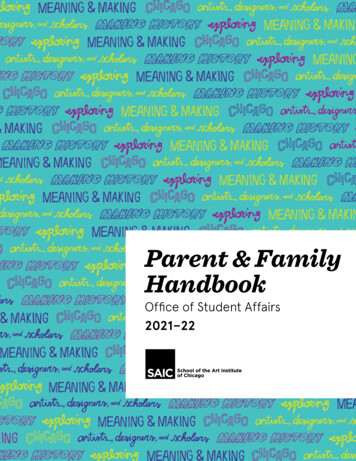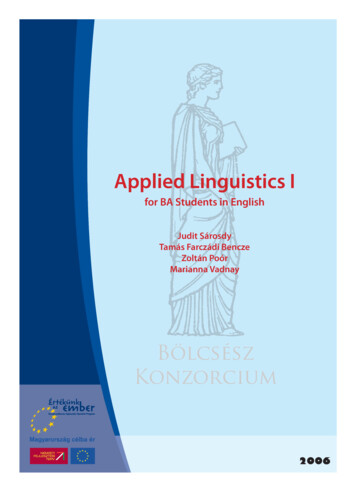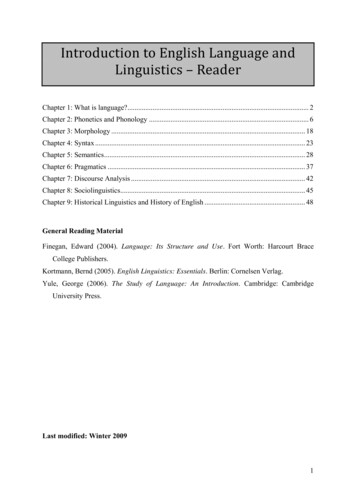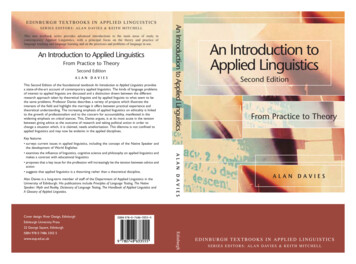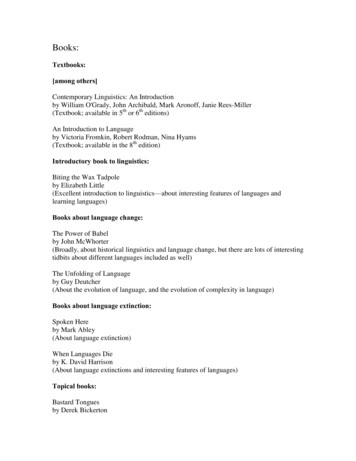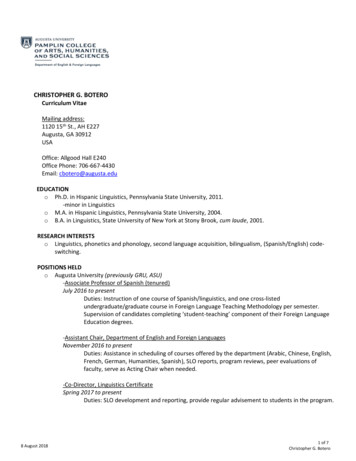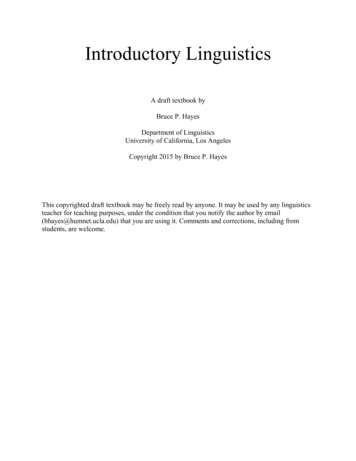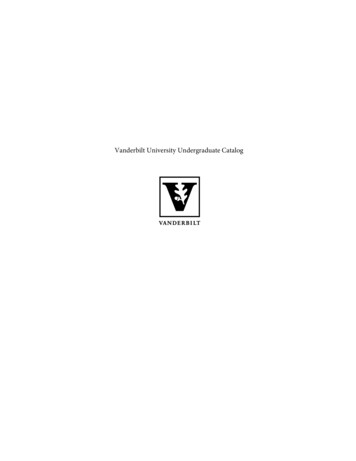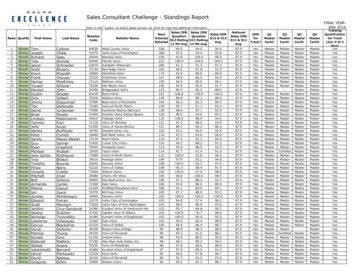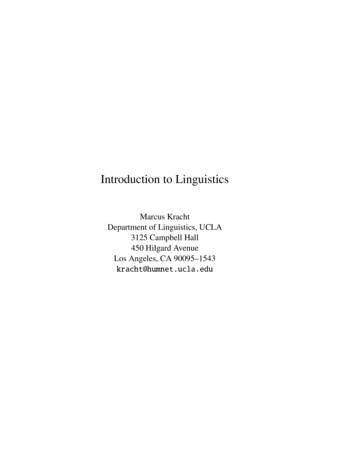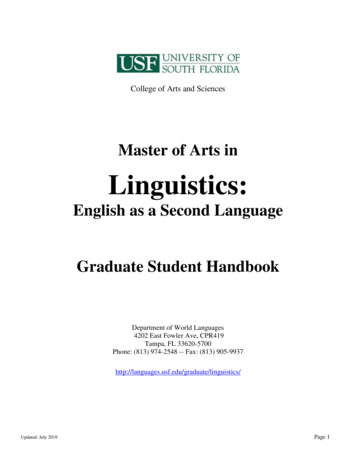
Transcription
College of Arts and SciencesMaster of Arts inLinguistics:English as a Second LanguageGraduate Student HandbookDepartment of World Languages4202 East Fowler Ave, CPR419Tampa, FL 33620-5700Phone: (813) 974-2548 -- Fax: (813) ics/Updated: July 2019Page 1
Table of ContentsPart 1: Where in the World? 3The University of South Florida 3The Department of World Languages 3The MA Program 4Part 2: How Do I Get Here? 5USF Admission Process 5Admission Requirements for the MA Program 5Additional Admissions Requirements for Non-Native Speakers of English 6Program Transfers from Other Institutions and from within USF 7Non-Degree-Seeking Status 7Time Limitations Related to Admission 7Full-Time Enrollment 7Part 3: I’m Here! Now What? 8Graduate Student Orientations 8Check-Lists for Domestic and International Students 8TESLLING 10LINGO 10Financial Assistance 10Part 4: Rules to Remember 12Office of Graduate Studies Requirements 12Advising and Student Responsibilities 12Student Conduct 12Time Limits 12Part 5: I’m In! How Do I Get Out? 13MA Program Policies and Requirements 13Overview of Degree Requirements 13Elective Policy 13Descriptions of Core Courses 14Descriptions of Elective Courses 15Typical Course Sequences for Full-Time Students (fall start and spring start) 16Grades and Grading 17Foreign Language Proficiency Requirement 17The Teaching Internship 18Exit Assessments 20Application for Graduation 21Part 6: Other Useful Tidbits 22Faculty and Staff 22Suggested Reading List 23Useful Links 24Appendices 26Advising Form 26Exit Assessment Rubrics 27Updated: July 2019Page 2
Part 1Where in the World?University and program settingThe University of South FloridaThe University of South Florida (USF) broke tradition when it was founded over six decadesago. The first major state university in America, planned and built entirely in the twentiethcentury, USF was Florida's first public metropolitan university - located purposely withincommuting distance of one quarter of the State's population. The University was founded onDecember 18, 1956, and opened on September 26, 1960, when it welcomed its first students:1,997 freshmen. Enrollment now exceeds 45,000, making it the second largest of Florida's tenstate universities. The University of South Florida was officially designated as a State UniversitySystem Research I institution in 1998-99. This recognition was based on factors such as theUniversity's research productivity, graduate enrollment, number of graduate degrees awarded,endowment, and overall size of the University's undergraduate population. USF students comefrom every state in the nation and more than 100 countries. They represent all ages, cultures, andethnic backgrounds. Nearly one quarter of the student population is African American, Hispanic,Asian American or Native American.Colleges. The University consists of 14 colleges: Arts and Sciences, Behavioral and CommunitySciences, Business, Education, Engineering, Global Sustainability, Graduate Studies, MarineScience, Medicine, Nursing, Pharmacy, Public Health, The Arts, and Innovative Education.Together, they offer many graduate degree programs and graduate certificates. The MA inLinguistics: English as a Second Language program is in the College of Arts and Sciences(CAS).Accreditation. USF is fully accredited by the Southern Association of Colleges and Schools, theofficial accreditation accrediting agency for institutions in the South.The Department of World LanguagesThe Department of World Languages at the University of South Florida consists of a number ofprograms in classical/modern languages, literatures, and applied linguistics. It offers courses ofstudy for both undergraduate and graduate degree programs within the liberal arts tradition.Foreign language study is available in a wide variety of languages. The Bachelor's degree inWorld Languages and Cultures includes concentrations in Applied Linguistics, ChineseLanguage and Culture, Classics, East Asian Languages and Cultures, French, German, Italian,Russian, Spanish, or a combination of these. Minors are available in several foreign languagesand in linguistics.Updated: July 2019Page 3
The MA ProgramApplied Linguistics is an interdisciplinary field that is primarily studied at theupper-undergraduate or graduate level. Students interested in graduate study in appliedlinguistics are urged take undergraduate classes in language, linguistics, or applied linguistics,regardless of their major field of study. Our program offers a Master of Arts in Linguistics:English as a Second language (ESL, non-thesis). In addition to courses involving linguistictheory and practice, the program offers graduate coursework in language teaching methodology,curriculum and testing, second language acquisition, cross-cultural issues, sociolinguistics, etc.The MA Program includes the study of all major aspects of human communication. It isanticipated, therefore, that students may come to our program from a variety of disciplinary andprofessional backgrounds.Closely allied with the MA Program is USF’s intensive English program: INTO USF. INTOUSF enrolls hundreds of international students annually who study English in the AcademicEnglish (AE), English for Academic Purposes (EAP), and General English (GE) programs.Many students will have the opportunity to do the teaching internships with INTO USF and/orwork in their tutoring center as a source of funding.Updated: July 2019Page 4
Part 2How Do I Get Here?What do I need to do to apply?USF Admission ProcessTo apply to USF, go to the following spx?cid 87<id 1 .As stated on the admissions website: “Please set aside approximately 30 minutes to complete theapplication and attach supporting documents. You may save what you have entered and return tothe application at any time in the future. After submitting the application you will be able to paythe 30 (USD) application fee by credit card (Discover, Visa, MasterCard) or E-check.”Application deadlines Fall deadline: February 15 Spring deadline: October 15International students may have earlier university-imposed deadlines. Please refer to the Officeof Admissions for these deadlines.Consult the current USF catalog (http://www.grad.usf.edu/catalog.php) for additional admissioninformation. Students on an F-1 visa should obtain information about financial supportrequirements for university study in the US.Admission Requirements for the MA ProgramAdmission requirements for degree-seeking students includes all University, College, andProgram requirements. Candidates who meet these requirements will be admitted upon theaction of the MA Program Director and the Dean of the College of Arts and Sciences.The program admission requirements are as follows: A completed bachelor's degree from an accredited college or university An updated curriculum vitae GPA of 3.0 or higher of undergraduate courseworko Updated: July 2019For applicants who have earned a master's degree or doctoral degree, we consider theapplicant’s graduate GPA.GRE scores (taken within the last five years) at or above 149 (430, prior scale) Verbal,and 4 or above on the Analytical Writing section are generally considered acceptable.oThe GRE requirement will not be waived.oUnofficial GRE scores, the report received in the mail about 3 weeks after the testmay be used to initiate the application. However, official scores will need to beprovided to USF’s office of admissions as soon as they become available.Page 5
o Three letters of recommendationo Applicants who have earned a master's degree or doctoral degree should consult withthe MA Program Director about the applicability of the 5-year requirement (althoughthe test itself is still required).It would be best if all letters were written by former professors, but at least one from aformer professor is needed. Letters from supervisors or trainers can address theapplicant's ability to learn. Employers can speak of the applicant's personal qualitiesthat might contribute to success as a graduate student and one of the letters may comefrom these sources. Letters from family or friends are not acceptable.A Statement of Purpose, a two-page writing sampleoThis statement will introduce the applicant to the Applied Linguistics faculty. Itshould address topics such as academic background, interest in the field, reasons forselecting our program, aspirations for graduate studies, and professional goals.oIf the applicant would like to be considered for funding (a TA position or afellowship), please also indicate this in the statement of purpose so that the facultycan direct the applicant to the appropriate sources.Additional Admissions Requirements for Non-Native Speakers of English TOEFL scores ofo 100 or higher on the internet-based test oro 250 or higher on the computer-based test oro 600 or higher on the paper-and-pencil testFor admissions purposes, the TOEFL exam is not required if applicants have earned a collegedegree in an English-medium university in an English-speaking country. Please note that takingESL courses does not exempt applicants from taking the TOEFL. Also note that students who areexempt from the TOEFL admissions requirement will later need to document Englishproficiency in order to complete the teaching internship requirement (if it is done on campus).While we accept the IELTS for admission purposes (although the TOEFL is preferred), this testis not accepted by USF to be hired as a TA. Thus, before the teaching internship (or other TAposition), English language mastery must be demonstrated through the TOEFL and/or TOEIC.The TOEFL is not required for a TA position for international students who come from anEnglish-speaking country. See the Office of Graduate Studies website for a list of thesecountries: http://www.grad.usf.edu/assistantships.phpPlease note that TOEFL scores are valid for two years for admission, according to the ETSwebsite: https://www.ets.org/toefl/ibt/faq/ (5 years for GA positions, per USF policy). If aTOEFL scores is more than two years old, the applicant will need to re-take the TOEFL orsatisfy the English proficiency requirement in one of the other sion-information/requirements-deadlines.aspxIn all cases, the Applied Linguistics faculty will be the sole arbiter in matters of admissibility. Inthe case of conditional admission, the faculty may specify additional requirements such asminimum GRE scores, prerequisites, minimum grade point averages, etc.Updated: July 2019Page 6
Program Transfers from Other Institutions and from within USF Typically, coursework from other programs at USF and other institutions is nottransferred to the MA in Linguistics: English as a Second Language. Each transferrequest will be handled on a case-by-case basis by the MA Program Director. Prospective students wishing to transfer from another graduate program within USF mustmeet the minimum requirements for the MA Program. Having been admitted to adifferent program at USF does not guarantee admission to the MA Program inLinguistics: English as a Second Language. Program transfer requests will be evaluatedfollowing the same criteria used for all other applicants. Regardless of whether a student is transferring from another institution or from anotherprogram at USF, it is the student’s responsibility to understand how the programtransfer will affect his/her financial aid. g StatusFor a variety of reasons, students may choose to take courses before being admitted into theprogram. When a student changes from “non-degree-seeking” status to full admission, up to 12credits of qualified coursework can be transferred to count towards the MA degree. It is thestudent’s responsibility to contact WLE’s academic specialist to complete the paperwork neededto have these courses transferred. This should be done immediately upon status change to fulladmission. Failure to complete this paperwork in a timely manner could results in a delayin graduation.Time Limitations Related to AdmissionAcceptance to graduate standing (i.e., acceptance to the program) is granted for the semester andthe particular program specified in the official acceptance notification. Students must validatetheir acceptance by enrolling in at least one course in the semester indicated in the officialacceptance notification. Failure to register for, and complete, at least one course during theadmitted semester invalidates the student’s admission. Deferral requests must be processed bythe semester indicated in the graduate catalog.Full-Time EnrollmentGraduate-level full-time enrollment is 9 credits for the fall and spring semesters and 6 credits forthe summer. All students holding TA positions must be enrolled as a full-time student during thesemester of the appointment. Domestic students with OPS (hourly) or adjunct appointments donot need to meet the full-time status requirements. International student visa requirementsstipulate that international students must be enrolled full-time during the fall and springsemesters, regardless of TA appointments. Full-time enrollment is not required for internationalstudents during the summer. International students should contact International Services(http://global.usf.edu/is/) for questions and the most up-to-date information about visarequirements.Updated: July 2019Page 7
Part 3I’m Here! Now What?What to do after you have been acceptedGraduate Student OrientationsThere are several orientations that students will potentially need to attend at USF:MA Program orientation: This orientation is held once the fall semester has officially begun. It isrequired that ALL students (both new and returning) attend this meeting. At this orientation,students will receive information about the program’s requirements and important procedures.The exact date will be announced in classes during the first or second week of the semester.Status: RequiredNew TA orientation: If students are first-time TAs in WLE, they will need to attend thedepartmental new TA orientation. The section supervisors will inform their TAs of the specificdates and times of this orientation, which typically takes place during the Monday, Tuesday, andWednesday of the week before the fall semester starts. If a student has been hired to teach atWLE for the first time but has not heard anything about this orientation, please contact the MAProgram Director. Status: RequiredGraduate school orientation: This orientation offered by the graduate school will give newgraduate students important information about graduate life at USF, and a chance to meet othergraduate students. http://www.grad.usf.edu/orientation.php Status: Highly recommendedInternational student orientation: International students may have additional requiredorientations. Please contact USF World for additional information. http://global.usf.edu/is/Note about mandatory TA training class: As of Fall 2014, all USF TAs must successfully pass aTA teaching course during their first semester of appointment. WLE has two department-specificcourses that replace the course offered by the graduate school. One of these courses (TSL 5371)is part of the required core coursework for the MA Program; thus, all of our students willautomatically have USF certification to be TAs upon successful completion of the course.Check-Lists for Domestic and International StudentsTo help ensure that students have done everything needed to do before the beginning of thesemester, please take a look at the following checklists. The first checklist is for both domesticand international students, and the second checklist includes additional items for internationalstudents.Updated: July 2019Page 8
Checklist for Both Domestic and International Students1. Contact the MA Program Director to verify attendance.2. Register for the courses indicated in the admission e-mail message via OASIS. Do NOTdeviate from these courses.3. Register for the TESLLING listserv.4. Investigate and register for the appropriate orientations.5. Contact the supervisor for TA position (if applicable).6. Investigate health insurance options. If students are a TA with a .25 FTE appointment orhigher, they have a different health insurance option than those students without a TA nefits/graduate-assistant-insurance.asp. Allinternational students are required to have health insurance at all ealth-services/insurance/inscompliance.aspx7. Submit immunization information. Requirements for domestic and international studentsdiffer. For more information, see Student Health Services. ervices/8. Get a student ID card from the USF card center in the Marshall Center. A USF ID card isrequired to activate the USF NetID, which allows students to access information online and touse the Campus recreation facilities. http://www.usf.edu/it/class-prep/usf-card.aspx9. Activate the USF e-mail account and NetID. All official USF communications, includingprogram information, will be disseminated via the USF e-mail. https://netid.usf.edu/una/10. Find a place to live. There is limited graduate housing on campus (the MagnoliaApartments), as well as a wide selection of living spaces near campus and in the Tampa Bay ingeneral. For information about on-campus housing, visit the Housing and Residential Educationwebsite: http://www.housing.usf.edu/options/11. Open a local bank account. Tampa Bay is home to many national and regional banks, sostudents have a wide variety of choices. The bank located on campus is the USF credit union:https://usffcu.org/Additional Checklist Items for International Students1. Verify personal information with International Services upon receiving admission notification.2. Check in with International Services.Updated: July 2019Page 9
3. Verify that English proficiency requirements for TA positions via the TOEFL or TOEIC havebeen met. Although supervisors/the MA Program Director will help remind students, ensuringeligibility to teach is ultimately the responsibility of the student.TESLLINGTESLLING is our program listserv for both current students and alumni. It is crucial thatstudents sign up as soon as a USF e-mail address is received, as all of the program’s importantannouncements are sent out via this listserv. Pay close attention to the messages sent via thislistserv (i.e., read carefully before deleting). Not all will pertain to everyone, but sometimesinformation is requested of students via this listserv (e.g., internship requests, advisingmeetings), and failure to read and respond in a timely manner could delay time to graduation.Once students are members, they can send a message to the listserv using the following address:teslling@lists.cas.usf.edu. Please limit e-mail dissemination to the address to academicannouncements. Please contact Dr. Amanda Huensch (huensch@usf.edu) to be added to this veryimportant e-mail list.LINGOLINGO is our Applied Linguistics graduate student organization. All students are encouraged tojoin, as it is a great way to get to know fellow students outside of the classroom. Some of theevents planned by LINGO include picnics, practice talks for academic conferences, bowling,dinners, happy hours, t-shirt planning, etc. For more information, contact the current LINGOgraduate student leadership.Financial AssistanceMany, although not all, of our students are able to find funding to support their graduateeducation. Financial assistance is available from several sources at the University of SouthFlorida, the most common being Graduate Teaching Assistantships (TA positions). Funding forMA students is typically coordinated by the MA Program Director to ensure that funding isallocated fairly among all students and that university regulations are met. Thus, even if a studentis searching for funding outside of the department (and we encourage this!), students should keepthe MA Program Director informed about applications for funding at the university. Funding caneither be in the form of a TA position (teaching), an RA position (research – this is not commonamong our students) or hourly (OPS). The TA positions of .25 FTE (about 10 hours/week) orgreater come with a partial tuition waiver and health insurance. If students are unsure if theposition is a TA position or OPS, get clarification! All information about graduate funding canbe found in USF’s Graduate Assistant handbook: nt-handbook.aspxThe following are some of the funding opportunities that are available to our students: Updated: July 2019TA for a language or content course in WLE: These assignments depend on language abilitiesand academic background. Some of the positions have specific applications (e.g., TA for aPage 10
Updated: July 2019Spanish language course), but some applications are more informal. If a student is interested inteaching in WLE, the student should contact the MA Program Director to express interest.WLE tutoring center: http://languages.usf.edu/tutoring/. The application for these positions is onthe WLE tutoring website. Please e-mail the Tutoring Coordinator (listed on the application) andcopy the MA Program Director.INTO USF tutoring center: er.aspx. To applyfor these positions, please e-mail the center director, Jordan Walters (jtwalters@usf.edu) with astatement of interest and CV. Also copy the MA Program Director on this initial e-mail.Teaching internship via INTO USF: http://www.usf.edu/intousf/. Many of our students are able tocomplete their teaching internship with INTO USF. See the section below for more details aboutthe internships.Library writing studio: http://www.lib.usf.edu/writing/Library tutoring: ter/tutoring/Students interested in the College Work Study Program (for low income students) or student loanprograms should contact University Scholarships & Financial Aid Services:http://www.usf.edu/financial-aid/.The Office of Graduate Studies website has a list of fellowships offered by USF. Students applydirectly to many of these fellowships, although some require a departmental/program nomination.Visit the following website to learn more about these hpThere are also a limited number of CAS fellowships, such as the University Graduate Fellowship.http://www.cas.usf.edu/Be sure to look in a variety of places for funding, internally and externally. For example, servingas a residence hall assistant for undergraduate dorms often comes with a tuition waiver andstipend. stant/index.aspxBe creative in the search. Many offices on campus need student workers, so check the USF employmentwebsite for additional opportunities. esources/Page 11
Part 4Rules to RememberAdditional administrative issuesOffice of Graduate Studies RequirementsThe Graduate School imposes certain general requirements upon all graduate programs at USF.These are outlined more completely in the USF Graduate Catalog. Although the MA Programprovides advice via the MA Program Director, other faculty members, and this handbook, theultimate responsibility for the satisfaction of requirements and compliance with all universitypolicies and regulations rests solely with the individual student.Among the requirements of the Office of Graduate Studies are the following:1. Minimum enrollment for students who hold graduate assistantships is nine semesterhours.2. All students must be enrolled for a minimum of two semester hours during their finalsemester. Please be aware that this is even the case if all required coursework has beencompleted.Advising and Student ResponsibilitiesAcademic advising and scheduling will be done in coordination with the MA Program Director.It is the student’s responsibility to meet with the MA Program Director one time every semesterduring the advising meeting time period (the middle of every semester – dates are announced viathe TESLLING listserv). Failure to do so may result in registration delays as well as delays ingraduation. Of course, students are encouraged to make appointments with the MA ProgramDirector at other times as well. Students are reminded of University Policy Statement 415:"Although the University provides advising services to assist students with academic planning,the responsibility for seeing that all requirements are met rests with the student."Student ConductMembers of the university community support high standards of individual conduct and humanrelations. Responsibility for one’s own conduct and respect of the rights of others are essentialconditions for academic and personal freedom at the university. USF reserves the right to denyadmission of refuse enrollment to students whose actions are contrary to the purposes of theuniversity, or impair the welfare of freedom of the members of the university community.Disciplinary procedures are followed when a student violates the code of conduct or commits anoffence as outlined in the Student Conduct Code. These are described in detail on the StudentAffairs Website: ken from section 7 of the Graduate Student Catalog 2014-2015)Time LimitsMaster's degrees must be completed within 5 years from the student's date of admission forgraduate study. Courses taken prior to admission to the USF graduate program, for example asnon-degree seeking or from other institutions that were transferred in, can be no older than sevenyears at the time of graduation. The form for a time extension (and all other graduate forms) islocated on the Office of Graduate Studies website: http://www.grad.usf.edu/student-forms.phpUpdated: July 2019Page 12
Part 5I’m In! How Do I Get Out?Steps to ensure successful graduationMA Program Policies and RequirementsThe Master of Arts in Linguistics: English as a Second Language requires 36 semester hourstotal. The 36-credit-hour requirement applies to all students. A student pursuing the degree on afull-time basis is expected to enroll in 9 credit hours, or 3 classes, per semester.Overview of Degree Requirements for the MA in Linguistics (ESL)CourseworkLIN 6081Introduction to Graduate Studies in LinguisticsLIN 5700Applied LinguisticsTSL 5371Methods of TESLLIN 6675Grammatical Structure of American EnglishTSL 5372ESL Curriculum and InstructionTSL 5525Cross Cultural Issues in ESLTSL 5440Language TestingLIN 6720Second Language AcquisitionTSL 6945Teaching InternshipNine credits (three classes) of approved electives offered by the Applied Linguistics facultyOther1. Foreign/second language proficiency2. A passing performance on the Pedagogical Theory (PT) and Classroom Practice andReflection (CPR) Exit exams (to be submitted the semester of the teaching internship)3. Completion of a final portfolio (to be submitted the graduating semester)Elective PolicyTypically, students will take all elective courses from faculty members in the Applied Linguisticssection. If a student finds a graduate (5000 level or above) elective outside the AppliedLinguistic offerings that relates to his or her specific interests, one of the three electives may betaken from a different section in WLE or from a different department. In such a case, the studentwill be required to fill out the “outside elective form” found in the Appendix of this handbookand should schedule a meeting with the MA Program Director to discuss if the proposed coursewould be a possibility. If the MA Program Director agrees, the student can use the outsideelective to satisfy one of the elective requirements. It is very important to note that theapproval process needs to happen before the student takes the external elective. Requestsmade during the same semester, or after the fact, will be denied.Updated: July 2019Page 13
Descriptions of Core Courses (each bearing 3 credit hours, unless otherwise stipulated) TSL 5371 Methods of TESL [generally offered in Fall] Prerequisite: none.Analysis of the methods of teaching English listening, speaking reading, and writing withattention to L2 culture and pragmatics. LIN 5700 Applied Linguistics [generally offered in Fall] Prerequisite: none.Analysis of the phonological, morphophonological, and syntactic features of English as abasis for linguistic application to problems of English language acquisition by non-nativespeakers. LIN 6081 Introduction to Graduate Studies in Linguistics [generally offered in Fall]Prerequisite: none. An introduction to the aims and methodologies of applied linguisticsas a graduate discipline: the field of linguistics, its subdisciplines, and its relationship toadjacent arts and sciences; bibliographical resources; methods of research and researchwriting; and a brief survey of the historical development of applied linguistics and currentissues in the field. LIN 6675 Grammatical Structure of American English [generally offered in Spring]Prerequisite: LIN 5700. Analysis and description of major morphological and syntacticstructures of American English, with emphasis upon applied linguistics. LIN 6720 Second Language Acquisition [generally offered in Spring] Prerequisites: TSL5371 and LIN 5700. An overview of major theories of Second Language Acquisition(i.e., Universal Grammar, cognitive, social interactionst, sociocultural), emphasizingseminal and current research studies. TSL 5372 ESOL Curriculum and Instruction [generally offered in Spring] Prerequisite:TSL 5371. Analysis of the methods of creating, modifying, sequencing, and assessingsecond/foreign language instruct
Science, Medicine, Nursing, Pharmacy, Public Health, The Arts, and Innovative Education. Together, they offer many graduate degree programs and graduate certificates. The MA in Linguistics: English as a Second Language program is in the College of Arts and Sciences (CAS). Accreditation.
